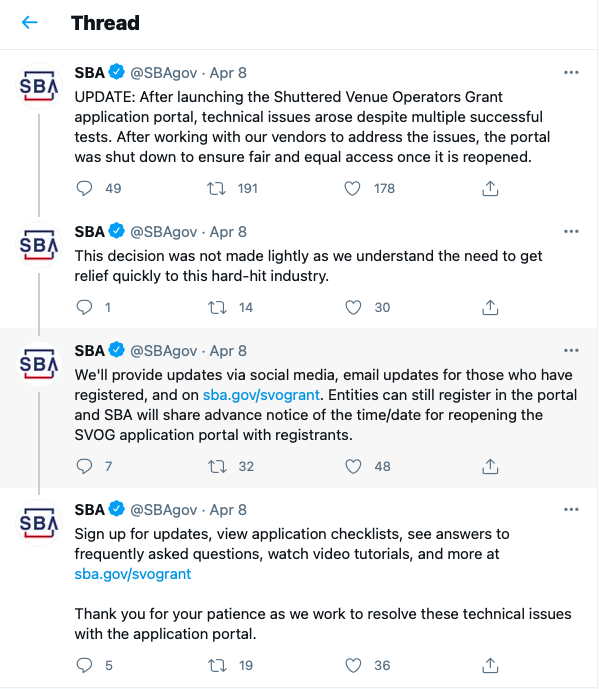Small Business Administration’s Grant For Music Venues Malfunctions At Launch
Live music has hit yet another roadblock on its path to return after the Small Business Administration’s Shuttered Venue Operators Grant (SVOG) program was shut down on its first day due to technical difficulties. Not a single application has been processed.
The portal opened for a brief moment according to schedule on April 8 but was pulled almost immediately, with SBA citing “technical issues” via Twitter. No new date has been announced for the long-awaited program to begin accepting applications again.
The SVOG program, created in December by the Economic Aid to Hard-Hit Small Businesses, Nonprofits and Venues Act, allots over $16 billion in funding to music venues, theaters, museums and other eligible entities. According to the program’s webpage, venues can apply for a grant equal to 45% of gross earned revenue, with a $10 million cap.
The portal’s failure exacerbates what is already a dire situation for live music. Without federal funding, an estimated 90% of independent music venues are at risk of permanent closure, according to the National Independent Venue Association (NIVA). NIVA was formed in April 2020 in response to the massive toll that COVID-19 shutdowns took on independent venues across the nation. It has been at the forefront of the fight to get funding throughout the pandemic. Getting the SVOG program (formerly known as the Save Our Stages Act) passed was the organizations’ main goal.
“This is a huge day for the independent arts and live venues across the country,” NIVA said on Instagram the day the program opened. “We know how big this moment is and we’ve been working all year to get here.” The post’s comment section was soon filled with confused and disappointed applicants, reflecting the immense letdown felt by those the program seeks to serve.
Despite the disappointment, the breakdown of the program launch was not a complete shock. One day ahead of the portal’s originally scheduled opening, the government oversight agency Office of Inspector General (OIG) released a report noting “serious concerns” about the SBA’s ability to implement and oversee the program.
But even before the OIG report and the technical difficulties that followed, the SVOG program’s first-come, first-served application model raised concerns among applicants. After last year’s Paycheck Protection Program, which handed out money to a number of questionable recipients and has since failed to count the number of jobs it saved (despite a legal obligation to do so), skepticism of the SBA is perhaps unsurprising. Regardless of doubts, SVOG funding remains the single most essential lifeline for venues.
While the reopening of the SVOG program (and accordingly, the fate of hundreds of venues across the country) remains in limbo, NIVA and other organizations are continuing to fundraise for struggling venues. Over the weekend, New York-based online publication Consequence (AKA Consequence of Sound) hosted a “Protect Live Music” benefit via livestream, with over 90 artists, including Fontaines D.C., Julien Baker and Beach Bunny, delivering performances or testimonials in support of live music. Proceeds from the event went directly to NIVA, which continues to give back to venues through its Emergency Relief Fund and has recently assembled a task force to assist in delivering SVOG funding.
Until artists can once again appear on stage rather than on screen, the fight to save independent venues continues. Live music is a vital aspect of almost every community, both economically and culturally. A return to life post-pandemic would be severely dampened by the absence of small venues and the performances they house. With the SVOG program’s continued delay, the possibility of this absence becomes more and more real, but hope remains that stages will be saved.











































































































































































































